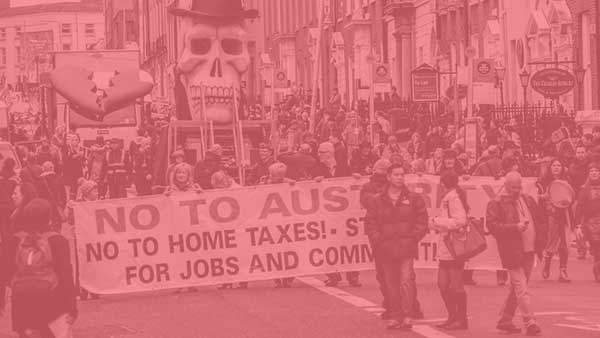Thatcherite economic policies are locked into the EU, and these are used as a cover by local politicians who pretend ‘they have no choice’.
These come in rules, directives and treaties and are supposedly backed up with fines. But when big countries ignore the rules, little is done. The threats are designed to intimidate countries in the periphery – or the PIGS as we were called. Here are some of the ways it works.
The Stability and Growth Pact: The EU says that a country cannot borrow more than 60% of its GDP or spend more than 3% beyond the tax revenues it takes in. This locks governments into low taxes and low social spending when combined with corporations who threaten to leave (think of the debate on Ireland’s 12.5% rate of corporation tax). When France or Germany breach these rules, nothing is done. But the Irish government uses this rule to say we cannot borrow to build public housing and recoup the loans from the rents paid. They even claim that the €8 billion in the Irish Sovereign Investment Fund cannot be used to build houses. This is unacceptable.
The ‘independent’ European Central Bank: The former head of this bank, Jean Claude Trichet, threatened that ‘a bomb would go off’ in Dublin if the Irish people did not hand over €64 billion to pay off the debts of private banks. This amounted to blackmail and the government should not have capitulated. The cost of that debt, in terms of public spending cuts and cutbacks to services was borne by the people of this country. We want that money back.
Competition rules about ‘distorting’ the market: If there is a charge for any public service, it falls into the EU category of ‘services of general economic interest’. This gobbledygook language is invoked to allow the EU to demand that private firms can compete for the service – and government ‘subsidies’ must be cut back. As we know from the proposal to impose water charges, these provisions would have opened the door to privatisation.
Privatisation directives: The EU has issued a series of directives to ‘liberalise’ electricity, gas, telecommunications and postal services. Liberalisation is a nice word for privatisation or part privatisation and it has been a disaster. In 2000, for example, Ireland was among the lowest for electricity prices in Europe, but today, after liberalisation, it has the highest electricity charges. One reason is that the ESB has been forced to subsidise the entry of private competitors to create a more ‘liberal market’.
Budget: Unelected bureaucrats now have more control over an Irish budget than many TDs in the Dáil. EU functionaries get a draft of the budget before it is brought to the Dáil and give ‘an official opinion’. If the budget does not limit public spending, they issue warnings and threaten fines.
Treaties: Following the Lisbon Treaty, the EU Commission is empowered to negotiate treaties with other countries around the world. But its mandate is to ‘achieve uniformity in measures of liberalisation’. To make matters worse, treaties like the current CETA treaty with Canada are negotiated in secret and allow big companies to sue governments if they are hampered by rules they think ‘distort’ the market.
All of these mechanisms are hard-wired into the institutional structure of the EU, making reform virtually impossible. A People Before Profit MEP will therefore see their role as helping to mobilise people in both Ireland and across Europe in defiance of these measures. Specifically,
If any left government emerges in Europe, we pledge maximum solidarity with its efforts to break from the Stability and Growth Pact and EU privatisation directives.
- We will support workers’ struggles against the effects of the EU austerity regime across Europe.
- We will ensure that our constituents are made aware of the mechanisms of corporate-friendly EU directives and the need to mobilise against them.
- We will demand that the ECB pay into a Brexit compensation fund to Ireland, whose purpose will be to compensate for economic losses and repair the damage caused by the bank bailout.
- We will use our position to reveal – where we can – the secret mechanisms by which the EU is negotiating treaties that will liberalise financial services and other areas.
- We will demand an end to undemocratic EU oversight of our budgets and insist that local people – whether in Ireland or elsewhere – have a right to decide on these matters.
- We will campaign for the Irish government to use the Irish Strategic Investment Fund to build social housing – no matter what the EU says.
